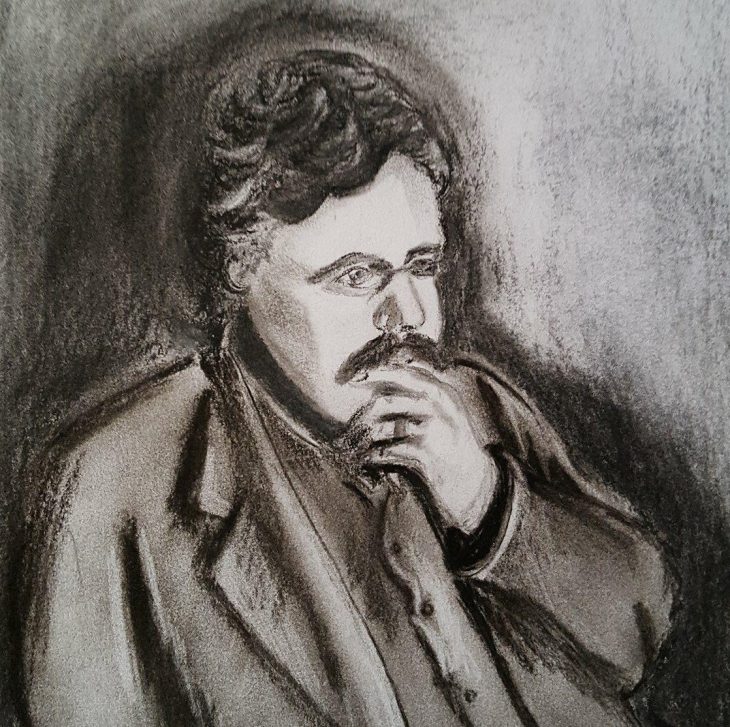
The Everlasting Man—A Review in the 21st Century
Samantha Michalski
The Everlasting Man, a novel written by G.K. Chesterton, changed the life of C. S. Lewis forever. It is said that this novel was the last step it took for him to become a Christian, before Lewis read it he was still an atheist, afterward he was a Christian.
Lewis had frequently said that anyone firm in their atheism cannot be too careful in what he reads, especially Chesterton. This novel is a Christian Apologetics written in the 1920s, it is sort of a direct opposition to H.G. Wells’ The Outline of History. This novel is very specific in the way it helps argue portrayals of human life and Jesus as the messiah, he tries to map out the spiritual history of Western Civilization as a whole. Wells argued in his novel that human life is a seamless development from animal life and Jesus Christ was simply a charismatic figure.
The book is labeled into two parts which are further broken down into many successive parts, Part I: The Creature Called Man, II: The Man in the Cave, III: Professors and Prehistoric Men, IV: God and Comparative Religion, V: Man and Mythologies, VI: The Demons and the Philosophers, VII: The war of the Gods and Demons, VIII: The End of the World, Part II: On the Man Called Christ, I: The God in the Cave, II: The Riddles of the Gospel, III: The Strangest Story in the World, IV: The Witness of the Heretics, V: The Escape from Paganism, VI: The Five Deaths of Faith, Conclusion: The Summary of This Book. As you can tell just from the outline, this book focuses very strongly on the evolution and adaptation of man and further that of Christ himself. After reading and looking farther into this book, I can completely understand why it changed C.S. Lewis’ life forever.
The novel is written so genuinely, Chesterton writes so well and develops his ideas seamlessly. He truly is able to change minds and allow people to see things differently. He even does this in most of his essays, he takes a topic that everyone seems to know very much about and he puts a twist on it and makes it become something much different and all together the same. Chesterton starts off the novel with a prefatory note explaining that the book itself has nothing directly to do with theology and religion, but everything to do with history and faith. He further acknowledges that it is solely based on Christianity versus Paganism, not Catholic versus Protestant, or any other battle.
Part one is completely and entirely written on man and how we have evolved over time, Wells argued that man was an evolutionary process from animal life. Chesterton argued that we are who we are, we’ve always been human. He starts off explaining that cavemen are like men today, they had art, they communicated, they were human. He further explains how civilizations are constructed and how they prosper. In this part he also explains belief and the history of religion. He explains that even when humans win the battle against demons they will always lose for one reason, they can never win the battle against their fallen nature, the nature of sin.
Part two is completely and entirely written on Christ and how He came to be the man He was when He gave His life. This section is written in the same form as part one, it begins with Christ in the cave, similar to man because all we know of cavemen is their drawings where all we know of Christ is the Scriptures and parables. It further breaks down who Christ is, what He means, and how to approach Him and the idea of Christianity. This part explains how in part one there was a hole in the world, the church filled that hole and further gave the world a purpose again, it gave the world a reason to be there. Part two of this novel gives man a purpose, it is about God and the church rescuing man from the fall that was described in part one. Man fell and continued falling until God came and rescued man; bringing man back to its purpose.
The book ends with explaining that humans were never just animals, they always had a purpose, they fell and continued falling into sin until they found that purpose, and Christ was not just a man, but so much more. There is a single line that really stood out while reading, “the divine madness was the sanity that stood against time.” This really is very true, while there are times that God and the church seem to be mad, that madness stands against all time. It stands for us and with us, to give us a purpose.
Chesterton and all of his works always seem to leave an impression and an influence, he just has a way of writing that sticks with you. C.S. Lewis was greatly impacted by Chesterton’s works, including The Everlasting Man. This novel was a final transitioning point for him in his faith and his conversion to Christianity. I can completely and entirely see why this novel impacted Lewis so much. The novel does help to solidify many ideas, themes, and theories that the Church gives and about life itself. Chesterton was able to describe the world in a completely new way, he typically does this in many of his essays. Chesterton is able to take one thing and completely change your mind on it, make it into something else. This story is an amazing read and it really cements the idea of Christianity, Christ, man, the Church, and God Himself.